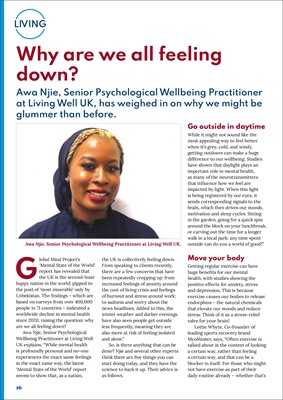
16
LIVING
Why are we all feeling
down?
Awa Njie, Senior Psychological Wellbeing Practitioner
at Living Well UK, has weighed in on why we might be
glummer than before.
Global Mind Project's
'Mental State of the World'
report has revealed that
the UK is the second-least
happy nation in the world; pipped to
the post of 'most miserable' only by
Uzbekistan. The findings - which are
based on surveys from over 400,000
people in 71 countries - indicated a
worldwide decline in mental health
since 2020, raising the question: why
are we all feeling down?
Awa Njie, Senior Psychological
Wellbeing Practitioner at Living Well
UK explains, "While mental health
is profoundly personal and no-one
experiences the exact same feelings
in the exact same way, the latest
'Mental State of the World' report
seems to show that, as a nation,
the UK is collectively feeling down.
From speaking to clients recently,
there are a few concerns that have
been repeatedly cropping up: from
increased feelings of anxiety around
the cost of living crisis and feelings
of burnout and stress around work;
to sadness and worry about the
news headlines. Added to this, the
winter weather and darker evenings
have also seen people get outside
less frequently, meaning they are
also more at risk of feeling isolated
and alone."
So, is there anything that can be
done? Njie and several other experts
think there are five things you can
start doing today, and they have the
science to back it up. Their advice is
as follows.
Go outside in daytime
While it might not sound like the
most appealing way to feel better
when it's grey, cold, and windy,
getting outdoors can make a huge
difference to our wellbeing. Studies
have shown that daylight plays an
important role in mental health,
as many of the neurotransmitters
that influence how we feel are
impacted by light. When this light
is being registered by our eyes, it
sends corresponding signals to the
brain, which then drives our moods,
motivation and sleep cycles. Sitting
in the garden, going for a quick spin
around the block on your lunchbreak,
or carving out the time for a longer
walk in a local park: any time spent
outside can do you a world of good!"
Move your body
Getting regular exercise can have
huge benefits for our mental
health, with studies showing the
positive effects for anxiety, stress
and depression. This is because
exercise causes our bodies to release
endorphins - the natural chemicals
that elevate our moods and reduce
stress. Think of it as a stress-relief
valve for your brain!
Lottie Whyte, Co-Founder of
leading sports recovery brand
MyoMaster, says, "Often exercise is
talked about in the context of looking
a certain way, rather than feeling
a certain way, and that can be a
blocker in itself. For those who might
not have exercise as part of their
daily routine already - whether that's
Awa Njie, Senior Psychological Wellbeing Practitioner at Living Well UK.